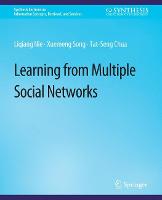


|
|
|
books
| book details |
Learning from Multiple Social Networks
By (author) Liqiang Nie, By (author) Xuemeng Song, By (author) Tat-Seng Chua

|
| on special |
normal price: R 1,602.95
Price: R 1,522.95
|
| book description |
With the proliferation of social network services, more and more social users, such as individuals and organizations, are simultaneously involved in multiple social networks for various purposes. In fact, multiple social networks characterize the same social users from different perspectives, and their contexts are usually consistent or complementary rather than independent. Hence, as compared to using information from a single social network, appropriate aggregation of multiple social networks offers us a better way to comprehensively understand the given social users. Learning across multiple social networks brings opportunities to new services and applications as well as new insights on user online behaviors, yet it raises tough challenges: (1) How can we map different social network accounts to the same social users? (2) How can we complete the item-wise and block-wise missing data? (3) How can we leverage the relatedness among sources to strengthen the learning performance? And (4) How can we jointly model the dual-heterogeneities: multiple tasks exist for the given application and each task has various features from multiple sources? These questions have been largely unexplored to date. We noticed this timely opportunity, and in this book we present some state-of-the-art theories and novel practical applications on aggregation of multiple social networks. In particular, we first introduce multi-source dataset construction. We then introduce how to effectively and efficiently complete the item-wise and block-wise missing data, which are caused by the inactive social users in some social networks. We next detail the proposed multi-source mono-task learning model and its application in volunteerism tendency prediction. As a counterpart, we also present a mono-source multi-task learning model and apply it to user interest inference. We seamlessly unify these models with the so-called multi-source multi-task learning, and demonstrate several application scenarios,such as occupation prediction. Finally, we conclude the book and figure out the future research directions in multiple social network learning, including the privacy issues and source complementarity modeling. This is preliminary research on learning from multiple social networks, and we hope it can inspire more active researchers to work on this exciting area. If we have seen further it is by standing on the shoulders of giants.
| product details |

Normally shipped |
Publisher | Springer International Publishing AG
Published date | 22 Apr 2016
Language | English
Format | Paperback / softback
Pages | 102
Dimensions | 235 x 191 x 0mm (L x W x H)
Weight | 0g
ISBN | 978-3-0310-1172-6
Readership Age |
BISAC | computers / networking / general
| other options |
|
|
|
To view the items in your trolley please sign in.
| sign in |
|
|
|
| specials |
|

|
Carl Morrow
Paperback / softback
160 pages
was: R 320.95
now: R 288.95
|
In this uniquely Southern African book, Carl Morrow and Keith Kirsten guide readers step by step into the magical realms of bonsai as a hobby, horticultural practice and art form.
|

|
André Alexis
Paperback / softback
176 pages
was: R 280.95
now: R 252.95
|
A pack of dogs are granted the power of human thought - but what will it do to them? A surprising and insightful look at the beauty and perils of consciousness.
|
Our moment has seen the resurgence of an anarchist sensibility, from the uprisings in Seattle in 1999 to the Occupy movement of 2011.
|
|
|
|